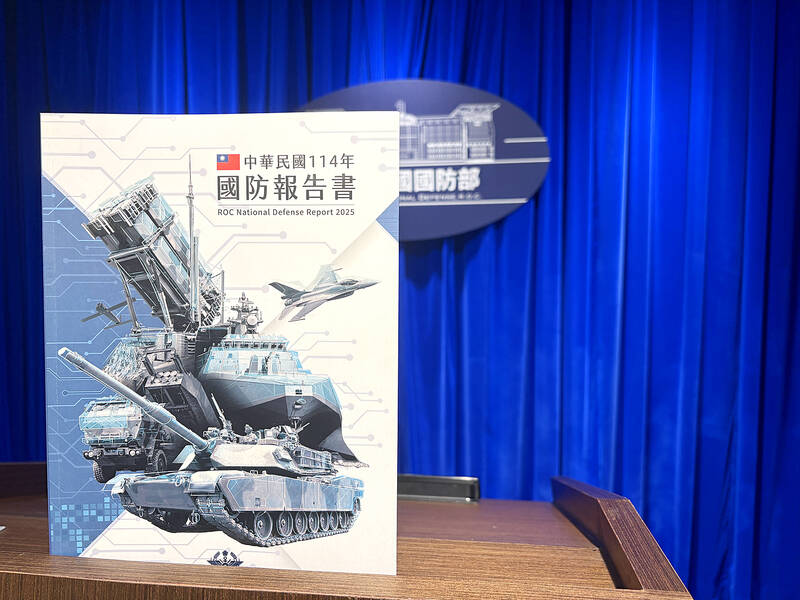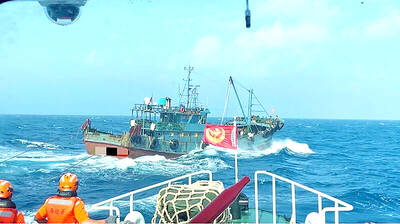The Ministry of National Defense yesterday outlined plans to build a more “agile and resilient” military with a new focus on multidomain strategies to deter and block enemy forces.
The new National Defense Report’s emphasis on multidomain denial — a defense approach rooted in attrition and asymmetric warfare — and on strengthening the resilience of the military and society sets it apart from previous editions, Lin Ying-yu (林穎佑), an associate professor at Tamkang University’s Graduate Institute of International Affairs and Strategic Studies, said in a prerecorded video.
Lin, one of the 11 experts who helped compile the report, which is released once every two years, cited this year’s Han Kuang military exercises, which included operations simulating the operations of medical and rationing stations, as an example of “whole-of-society resilience.”

Photo: CNA
Colonel Hsu Chih-hung (許志宏) of the Department of Strategic Planning told a news conference that the multidomain denial focus aims to build a multilayered defense against a range of threats.
Guided by the principles of being “maneuverable, agile, lethal, cost-effective and concealed,” and driven by mission requirements, the military seeks to build a mission-oriented defensive system that spans land, sea, air, space and cyberspace, Hsu said.
Although the report dedicates a section to China’s military threats, some crucial developments — such as the unveiling of new weapons systems at China’s Sept. 3 military parade marking the 80th anniversary of the end of World War II, and the Shandong and Liaoning aircraft carriers passing through waters east of Taiwan in June and crossing the second island chain — were notably absent.
Department official Hsu Yun-chen (許云甄) said that noteworthy developments in the Chinese military would be included in a separate report on China’s military power, which is to be published at a later date.
China is increasing military activities near Taiwan and honing its ability to stage a surprise attack, as well as seeking to undermine trust in the government with “hybrid” online warfare tactics, the report said.
“The Chinese communists have adopted routine gray zone harassment tactics, combined with joint combat readiness patrols, targeted military exercises and cognitive warfare, posing a comprehensive threat,” it said.
The China Coast Guard is expanding its activities around Taiwan and might take “aggressive containment measures” in concert with the military while rehearsing attack scenarios, it said.
Beijing is also using “hybrid warfare” to weaken trust in the government and support for defense spending, while using artificial intelligence tools to weaken Taiwan’s cybersecurity and to scan for vulnerable points in critical infrastructure, it added.
The report also touched on Chinese drone incursions, saying that the ministry is training soldiers to shoot down drones and seeking to procure new anti-drone weapons systems.
Ministry spokesman Major General Sun Li-fang (孫立方) said the military is continuing efforts to identify and use effective anti-drone systems in response to China.
“Basically drone developments and anti-drone developments are very fast, and based on today’s situation, there is different progress every day,” he said. “This is one of our key points in our military preparedness efforts.”
Taiwan’s anti-drone efforts are a top priority, and soldiers in the outlying islands are also practicing night shooting as part of the training, the ministry said.
The ministry said it is working on an English-language version of the report, which would be available on its Web site.

POLITICAL AGENDA: Beijing’s cross-strait Mid-Autumn Festival events are part of a ‘cultural united front’ aimed at promoting unification with Taiwan, academics said Local authorities in China have been inviting Taiwanese to participate in cross-strait Mid-Autumn Festival celebrations centered around ideals of “family and nation,” a move Taiwanese academics said politicizes the holiday to promote the idea of “one family” across the Taiwan Strait. Sources said that China’s Fujian Provincial Government is organizing about 20 cross-strait-themed events in cities including Quanzhou, Nanping, Sanming and Zhangzhou. In Zhangzhou, a festival scheduled for Wednesday is to showcase Minnan-language songs and budaixi (布袋戲) glove puppetry to highlight cultural similarities between Taiwan and the region. Elsewhere, Jiangsu Province is hosting more than 10 similar celebrations in Taizhou, Changzhou, Suzhou,

The Republic of China (ROC) is celebrating its 114th Double Ten National Day today, featuring military parades and a variety of performances and speeches in front of the Presidential Office in Taipei. The Taiwan Taiko Association opened the celebrations with a 100-drummer performance, including young percussionists. As per tradition, an air force Mirage 2000 fighter jet flew over the Presidential Office as a part of the performance. The Honor Guards of the ROC and its marching band also heralded in a military parade. Students from Taichung's Shin Min High School then followed with a colorful performance using floral imagery to represent Taiwan's alternate name

COGNITIVE WARFARE: Chinese fishing boats transmitting fake identification signals are meant to test Taiwan’s responses to different kinds of perceived incursions, a report said Chinese vessels are transmitting fake signals in Taiwan’s waters as a form of cognitive warfare, testing Taipei’s responses to various types of incursions, a report by the Institute for the Study of War said on Friday. Several Chinese fishing vessels transmitted fake automatic identification system (AIS) signals in Taiwan’s waters last month, with one mimicking a Russian warship and another impersonating a Chinese law enforcement vessel, the report said. Citing data from Starboard Maritime Intelligence, the report said that throughout August and last month, the Chinese fishing boat Minshiyu 06718 (閩獅漁06718) sailed through the Taiwan Strait while intermittently transmitting its own AIS

CHINESE INFILTRATION: Medical logistics is a lifeline during wartime and the reported CCP links of a major logistics company present a national security threat, an expert said The government would bolster its security check system to prevent China from infiltrating the nation’s medical cold chain, a national security official said yesterday. The official, who wished to stay anonymous, made the remarks after the Chinese-language magazine Mirror Media (鏡周刊) reported that Pharma Logistics (嘉里醫藥物流) is in charge of the medical logistics of about half of the nation’s major hospitals, including National Taiwan University Hospital and Taipei Veterans General Hospital. The company’s parent, Kerry TJ Logistics Co (嘉里大榮物流), is associated with the National Committee of the Chinese People’s Political Consultative Conference (CPPCC) and the Chinese People’s Liberation Army (PLA), the